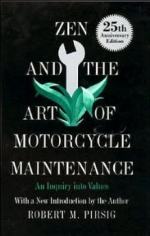
|
1. In Chapter 1, the Narrator says that sometimes when truth knocks on the door you tell it to go away because you are looking for truth. He also introduces the idea of the Chautauqua, saying he will be concerned more with the question of "What is best?" than the question of "What's new?" How are those ideas related to one another?
Truth is always best, but not necessarily new. In fact, truth can be quite old. The Narrator plans to delve deeper into the truth and what leads to the truth in his Chautauqua-style talking along the trip. Truth is not always recognized as truth until viewed by hindsight.
2. What is the difference between "What's new?" and "What is best?" What type of answer might you get to each question? Which question would you prefer to ask your friends? Which question would you rather have people ask you?
"What's new?" is a superficial question while "What is best?" forces people to evaluate critically at least two alternate ideas or options. The person then has to assign value to each aspect of each option. That value can be relative to the question at hand, relative to the person doing the evaluating, or relative to society in general. "What's new?" is a very low level of thinking such as "what was the character's name?" while "What is best?" is a very high level of thinking used to help people sort through a variety of thoughts. Answers to "What's new?" would range from (1) "I got an A on my history test" to (2) "We're going on vacation next week" to (3) "nothing." Answers to "What is best?" might include (1) "getting my homework done before going out with friends, or (2) "telling the truth about the dent in the car fender" to (3) "volunteering with a community organization."
(read all 60 Short Essay Questions and Answers)
|
This section contains 9,311 words (approx. 32 pages at 300 words per page) |

|




